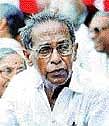The austerity of Nripen Chakraborty, the late chief minister of Tripura, who passed away in 2004 at the age of 99 is legendary. S R Sankaran, himself a legendary former IAS officer of Andhra Pradesh, known for his spartan living and lifelong commitment to the welfare of the underprivileged, who served the late Chakraborty as his chief secretary in late 1970s and 1980s recalled some events that stood out in his memory.
Chakraborty, as CM, lived and worked out of one-room in the (CPI-M) party office. When he moved out at the end of the term, his belongings fitted in a tin box that was barely bigger than a brief case. He loaded that on a rickshaw and shifted to a room in the MLAs’ quarters. He was a bachelor and had no property.
Once on one of the many trips to Delhi to plead for more funds for the state, he told Sankaran that he wanted to buy ‘good’ shirting material. Knowing that he had confused Sankaran, he explained that he wanted to gift it to his driver’s son on his birthday and so was looking for a ‘better’ cloth. At another time, when the then Union labour minister Raghunath Reddy was visiting Tripura, Chakraborty invited him for breakfast along with Sankaran. Reddy too was known for his austere ways. They were served two gulab jamoons and a cup of tea. Reddy apparently was waiting for the main dish to be brought. Sankaran informed him in Telugu that breakfast was over, prompting Reddy to comment that Communists can be austere in their ways but they should be told to eat a good breakfast!
At the end of Sankaran’s term, he gave a farewell dinner. The invitees were all of two: himself and Sankaran. He had two wooden chairs placed at a wooden table and served rice and one sabji. When Sankaran’s face registered dismay on eating the first mouthful, Chakraborty informed him that it was the same rice that Sankaran supplied to the poor through ration shops!
“He was a great man..really an extraordinary person.. I learnt so much from him,” said Sankaran, who himself is a hero to thousands of Dalits and tribals in AP whose lives he touches daily, both in his personal capacity and as bureaucrat, who formulated policies and schemes that have benefited several generations.
